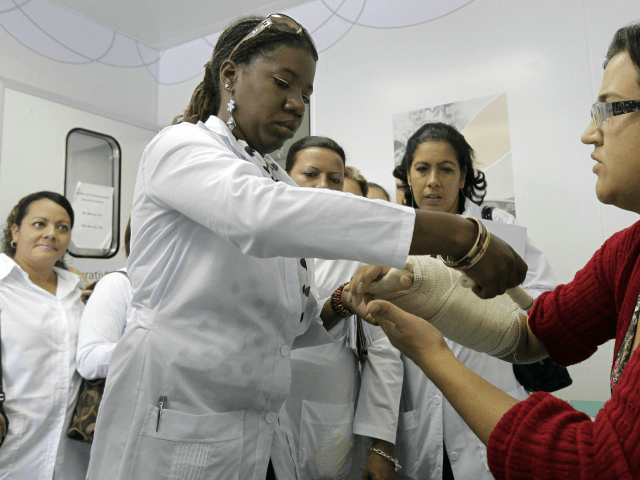Brazil’s Ministry of Health announced on Monday that it had filled 97.2 percent of the doctor positions open following the Cuban government’s decision to immediately abandon a program offering medical care to the nation’s most remote, underprivileged areas.
The socialist government of former President Dilma Rousseff launched the program – called “Mais Médicos,” or “More Doctors” – before her impeachment and removal in 2016. Mais Médicos relied on importing thousands of Cuban doctors to work without receiving a salary throughout Brazil. Brazil paid the salaries directly to the Cuban communist regime, which used the money to reinforce social control domestically and enrich Castro family leadership.
This month, conservative President-elect Jair Bolsonaro announced that, upon taking office in January, he would demand the Cuban regime pay full salaries to its doctors and allow the doctors to bring their families to Brazil, a practice Cuba bans for all its doctors working to enrich the regime around the world. Bolsonaro also demanded that Cuba allow Brazilian health officials to test the doctors to ensure their skills were up to the standard of a Brazil-educated physician.
In response, the Cuban regime announced its immediate withdrawal from Mais Médicos, claiming Bolsonaro’s remarks were “threatening” and “unacceptable,” leaving the current government of President Michel Temer scrambling to fill over 8,000 medical positions nationwide.
Brasilia began accepting applications from domestic doctors to replace the Cubans on Wednesday, November 21, noting that many of the jobs on hand would force the doctors to move to remote parts of the country, but still offering a $3,034 a month salary. The government opened the Mais Médicos job applications to Brazilian nationals with medical degrees completed in Brazil.
Less than a week later, the Ministry of Health announced that nearly all of the positions opened had been filled. According to the Brazilian newspaper O Globo, the government has hired 8,278 doctors for the 8,517 positions opened. Over 30,000 Brazilian doctors applied for the openings, meaning that many of the candidates are still being processed to fill the remaining open slots.
The new doctors will work in nearly 30,000 towns and cities nationwide and some of the new doctors have taken their positions on immediately. The Ministry of Health announced that 224 new doctors went into work on Monday, replacing withdrawn Cuban physicians.
President Michel Temer issued a statement Monday vowing that he would “not leave this problem to the new government,” suggesting that no poor communities would fail to have a doctor working for them due to the diplomatic fallout with Cuba by the time Bolsonaro assumes the top office.
The ministry noted that they managed to receive and process thousands of applications despite what appeared to be a cyberattack against the Mais Médicos website, where doctors were expected to apply. At press time, maismedicos.gov.br remains down.
Brazil’s speedy recovery from the Mais Médicos scandal is a tremendous embarrassment for both the former socialist governments and the Cuban communist regime, which argued that Brazil could not maintain a functional healthcare system without paying hefty fees to Cuba for doctors who work as slaves. At the time of Cuba’s announcement canceling the deal, experts feared that up to 600 towns and cities could be without a doctor if the Cubans withdrew, leaving the nation’s most socioeconomically vulnerable without access to medical care. Concerns are still present that the Brazilian doctors taking on the jobs may quit immediately upon arriving in the remote areas where their jobs require them to work, though with the 30,000 applicants expressing interest, Brasilia may swiftly replace them if necessary.
The Cuban government, as of Monday, has withdrawn 1,307 doctors from Brazil of the 8,300 currently working there. Most received immediate orders to present themselves at Brazilian airports to return home. If they choose not to return, Havana bans the doctors from Cuba for at least eight years, often a prohibitive amount of time to be away from family, especially for those with young children. Yet many of the Mais Médicos physicians have said they are interested in staying in Brazil, some saying they would rather work unskilled labor jobs in a free country than return to communism.
Unlike the past socialist governments, Bolsonaro has promised that Brazil will offer political asylum to any doctor who requests it.

COMMENTS
Please let us know if you're having issues with commenting.